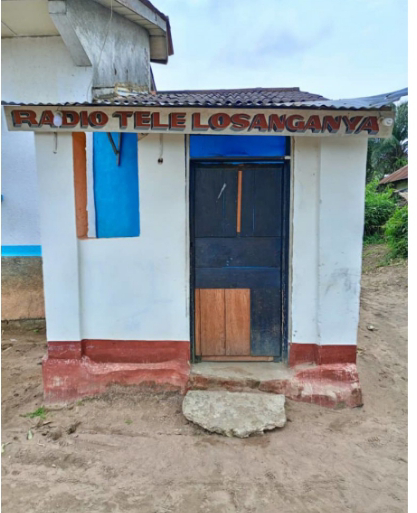On October 25, 2022, Bono Emakitshi, administrator of the Lodji territory in the Democratic Republic of the Congo’s central Sankuru province, issued a directive suspending the operations of privately owned broadcasters Radio Losanganya and Radio Grand Tam-tam. Bono also ordered the outlets’ transmitters to be seized until further notice.
Bono alleged that the outlets broadcast insults, incitement of hatred, and hate speech, and lacked journalistic ethics, according to the directive, which CPJ reviewed, news reports, François Lendo, director of Radio Losanganya, and Jean-Paul Osongo, director of Radio Grand Tam-tam, whom both spoke to CPJ via messaging app. Bono did not reference any specific broadcasts in his directive.
“Radio Losanganya and Radio Grand Tam-tam are contributing to the aggravation of the already tense political climate,” Bono wrote in his directive, referencing the relationship between two local politicians who own the two radio stations. “If we are [not] careful, these two radio stations risk causing a bloodbath and mourning” in Lodji.
Lambert Mende Omalanga owns Radio Losanganya and Jean-Charles Okoto owns Radio Grand Tam-tam, according to Lengo and Osongo. The owners both hold political positions as national deputy, as part of the Congolese parliament. Since September 2022, Mende and Okoto have been engaged in a separate legal dispute over embezzlement allegations, according to a report by privately owned news website Mediacongo.
Osongo told CPJ that the two sanctioned outlets did not broadcast defamatory or hateful remarks but rather criticized each other’s owners and their management as elected officials, arguing that Bono confused criticism with insult.
On October 28, Mende filed a complaint with the Sankuru Court of Appeal, which argued that Bono did not have the authority to suspend Radio Losanganya, Lendo and Djongo said. The appropriate authority would have been the Superior Council for Communication and Audiovisual (CASC), a local regulator with powers to impose administrative sanctions on media concerning violations of journalist ethics and professional conduct, Djongo said.
On November 2, the Sankuru Court of Appeal ordered the suspension of Radio Losanganya to be dropped because Bono did not have the authority to close the broadcaster, according to a copy of the decision reviewed by CPJ and Raphael Djongo, a lawyer for Radio Losanganya, who spoke to CPJ over the phone. However, as of November 28, Radio Losanganya remains off-air and under police guard, Djongo told CPJ.
The court decision did not mention the suspension of Radio Grand Tam-tam, which remains closed and under police guard as of November 28, according to Djongo and Osongo. Osongo told CPJ that no legal action had been taken to reopen Radio Grand Tam-tam.
On October 27, Bono told CPJ by phone that he had shut down Radio Losanganya and Radio Grand Tam-tam and confiscated their transmitters because of ongoing tension between the broadcasters. CPJ called Bono after the November 2 court of appeal decision, but he did not pick up.
Jules Lodi Emongo, the governor of Sankuru province, did not answer CPJ’s calls.
In late September, Emongo ordered the closure of two other Sankuru broadcasters–Radio Ekitela and Radio Numbampela–over accusations that they promoted tensions in the province. The two stations remain off air and neither outlet has taken legal action to restore access, Radio Ekitela director Franck Danga told CPJ.
